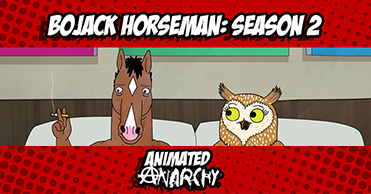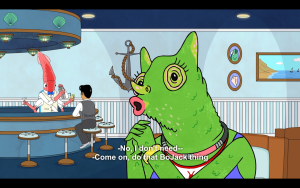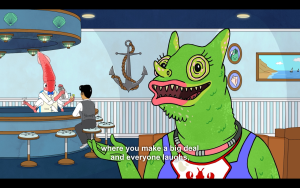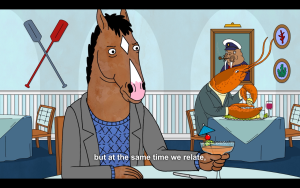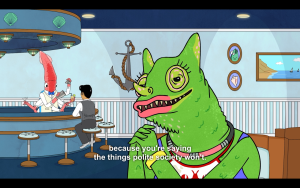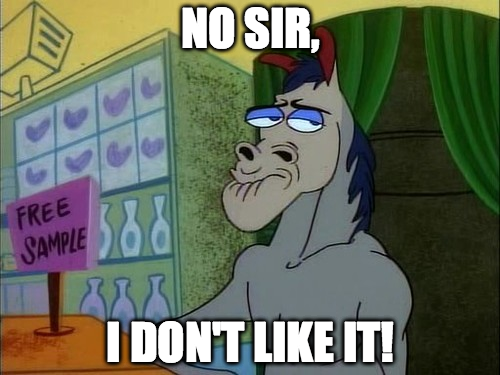As my thoughts on Bojack Horseman are relatively well known amongst my friends and readers, I still wanted to persevere because of the potential this show has. Creator/writer Raphael Bob-Waksberg converted most people by pulling the dramatic shift halfway through, proving Bojack Horseman had legs when it came to character development and tension. It is perfectly devised to fit with Netflix as the company is pulling all sorts of renegade maneuvers with their original programming. For their comedies, we’ve had the successful revival of Mr. Show called W/ Bob and David and Aziz Ansari’s Master of None has elevated the actor to brilliant status. There’s a lot of pressure for Bojack Horseman to represent good animation on Netflix, especially with the company is in talks to open an animation studio.
Originally, I wanted to do a list of the “Best Current Cartoons of 2015,” but that had to be delayed because some shows are undergoing massive developments. So while that’s under current deliberation, I thought I’d cover a show that I’ve been itching to write about since the second season dropped.
Season 2 picks up directly from where Season 1 left off, as Bojack is begrudgingly accepting his new found fame while acting in his dream role of the “Secretariat” movie. He strikes up a relationship with former TV executive/coma victim Wanda Pearce, whose aged ideology gives Bojack hope he may finally be with the one. Meanwhile, his agent Princess Carolyn forms a new relationship with the slick talking co-worker Rutabaga Rabbitowitz as the two start to lose interest in their company. Mr. Peanutbutter’s career resurrects becoming the host of Hollywoo’s newest game show, while Diane contemplates her life as writer attack media icons and shadowing the life of billionaire helping refugees in a third world country. Bojack and his company continue to discover if they can find happiness as the celebrity industry sprawls uncontrollably into their personal lives.
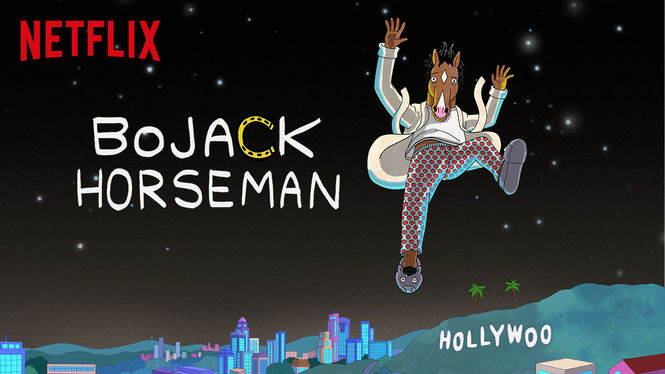
I’m just going to come out and say it. Bojack Horseman is the most overrated cartoon I can remember in recent years. Bojack’s critical acclaim and overwhelming support from online watchers continues to shock me on so many levels. I feel that if this were a live-action drama airing on HBO or Showtime, it would be immediately dismissed as another cliché that poorly riffs on the excess, despair and superficiality of Hollywood. The series lives in a strange bubble where people give it the benefit of the doubt of having this additional level of nuance BECAUSE it has talking cartoon animals.
What Season 2 fails to capture from the heels of Season 1 is that there is rarely any sense of character progression. As much as this talented voice cast delivers good performances, they are wasted on playing one-note characters. Although the drama can be relatable and compelling for its willingness to be bleak; the emotion frequently rings hollow because most of the problems are fabricated by melodramatic stupidity. Every time I want to give this show credit for being insightful or genuinely funny, Bojack Horseman constantly has to remind me how self-gratifying smart and clever it thinks it is.
Bojack Horseman’s humor centers around two major cornerstones: cringe factor and over-explanation. The more I watched this show, I could get the feeling that Rapheal Bob-Waksberg was aiming for an Arrested Development level of farcical comedy with multilayered jokes and reoccurring themes. But where Mitchell Herwitz could capture that balance of ignorance and clever wordplay with the Bluth Family, Bob-Waksberg thinks that his insults towards celebrity culture are downright innovative when they are obviously cookie-cutter archetypes. I barely ever laughed whenever the show reached the punchline. The writers never allowed a turn-a-phrase to linger in the air; almost every character had to overstate why the jokes are funny.
The show’s style of humor is the biggest disconnect because the characters constantly informs me that I’m watching an unfunny cartoon. My least favorite episode of this whole season was the second episode Yesterdayland, where Todd’s created halfbaked knock-off of Disneyland, but the courts forgave him because Walt Disney spelled the original name of Disneyland wrong on the contract. That is a cliché ripped straight from the 80s sitcom era and most TV critics would blame any modern sitcom for trying to pull it off in our modern, more intelligent era. But the single worst thing about this same episode is that it has the most insipid string of dialogue that encapsulates absolutely everything wrong with Bojack Horseman’s schtick.
That chameleon just devalued so much of the show by spoonfeeding to us what Bojack is all about. We already know this; we don’t need to be told how the formula works. By admitting you are a tired drama using sitcom-level stupidity and logic doesn’t make you a clever meta commentary, you just come off as a badly written show. Upon watching Channel Federator’s 107 Facts on Bojack Horseman; I’ve deduced that all the faults are from the character writing. The animators are solely responsible for all the wonderful visual/animal-based gags while intentionally written jokes have a tendency to get edited and shuffled between episodes due to the full season release.
The error in the comedic timing is best explained in 15th episode of the 10th Season of The Simpsons titled “Screaming Yellow Honkers.” Skinner and Chalmers are about to do the classic “Who’s on First?” Routine but Skinner ruins it horribly.
Chalmers: Well, Seymour, it seems we’ve put together a baseball team, and I was wondering, who’s on first, eh?
Skinner: Yes! Not the pronoun, but rather a player with the unlikely name of “Who” is on first!
Chalmers: Well, that’s just great, Seymour! We’ve been out here six seconds and you’ve already managed to blow the routine!
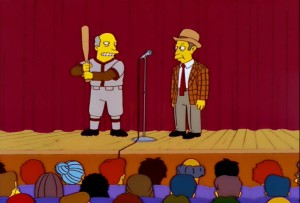 Chalmers made that blunder hysterical in six seconds. Bojack did a riff on “Who’s on First?” as well, because his Doctor is named Doctor Hu. Bojack explains to junkies the difference between the two pronouns because of the BBC show…ad nauseam for two minutes. It reminds me so much of the repetitive anti-gags done in Tim and Eric sketches, made the most clear when Bojack has to repeat the line “I’m running in circles!” 10 times while on a treadmill.
Chalmers made that blunder hysterical in six seconds. Bojack did a riff on “Who’s on First?” as well, because his Doctor is named Doctor Hu. Bojack explains to junkies the difference between the two pronouns because of the BBC show…ad nauseam for two minutes. It reminds me so much of the repetitive anti-gags done in Tim and Eric sketches, made the most clear when Bojack has to repeat the line “I’m running in circles!” 10 times while on a treadmill.
As much as this show is valued for being a strong character drama, nearly every tumultuous moment is undercut by the blatant attempts of levity. For example, I actually enjoyed the evolution Princess Carolyn this season. I was so happy that Carolyn had a character like Rutabaga to work off of, showcasing her intelligence and drive like the two-parter in the first season accomplished. My sympathy for her never clicked as she was dumb enough to fall in love with a kid in a trenchcoat, but when that subplot was mercifully cut, she became a much stronger character.
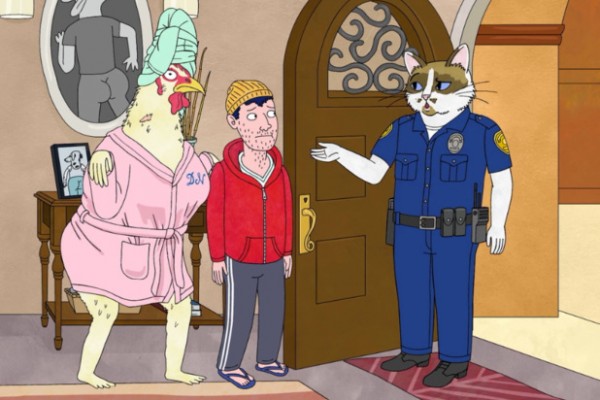
Mr. Peanutbutter and Diane Nyguen got a pretty big boost as well, as PB finally has plot relevance by re-entering the Hollywoo elite. Now that he serves more than a comic foil, I can believe in his emotional neediness due to Diane’s personal indecisiveness and detachment. He has a speech in the fourth episode that is very on the nose, but it actually works to his advantage when he admits he is lonely like a housedog. Diane on the other hand gets the best episode of the season, “Hank After Dark”, where she challenges a public icon in the vein of the Bill Cosby scandals, commenting on the frequent arguments over feminism versus Internet terrorism quite well.
However, we don’t get much time analyzing everyone, as this series has to be focus on the titular and always horrible Bojack. Bojack is sadly a dime-a-dozen character; a broken bird who tried to find solace in acting to fill up the emotional void left by his terrible parents. The writers try to give Bojack more dimension throughout the series, but he spends most of his screen time parroting the audience’s frustration of dealing with media idiots obsessing over fake, celebrity problems.
I had hope that Bojack would evolve as a character with the introduction of Wanda, who is voiced by the ever-charming Lisa Kudrow. One recurring character points out that Bojack makes a great partner with the amnesiac Wanda because, “After you get famous you stop growing, because you don’t have to.” Wanda worked as a good counterbalance whose naivety could serve as a source of satire and growth for both characters, as their relationship grew about in a realistic fashion. But the season ultimately falls apart when the writers had to underline how much Bojack is a despicable, lonely jerk.
Season 1’s “Downer Ending” worked as the series emotional core to give hope that there was a point to Bojack’s cynical attitude and destructive flaws. But Season 2’s penultimate episode “Straight from L.A.” snuffed out all the goodwill I could possibly have for this character and series evolving. When Bojack gets involved with screwing up the lives of teenagers because of his romantic insecurities, it broke so much of what could make this character in any way redeemable. His inexplicable power to fail upwards just made me despise him no matter how much he claims he wants to change or be a better person.
Some fans have told me they like Bojack Horseman in the sense that he is a black hole character; a toxic entity who ruins the lives of anyone he comes across. He doesn’t need to be likable or sympathetic, but he even lacks the humor or insight to make his mentality entertaining. I don’t even find pleasure in the way he harms the other characters, because they spend most of their time getting wrapped up in sitcom shenanigans. And that brings me to the biggest problem I have with the praising of this show.
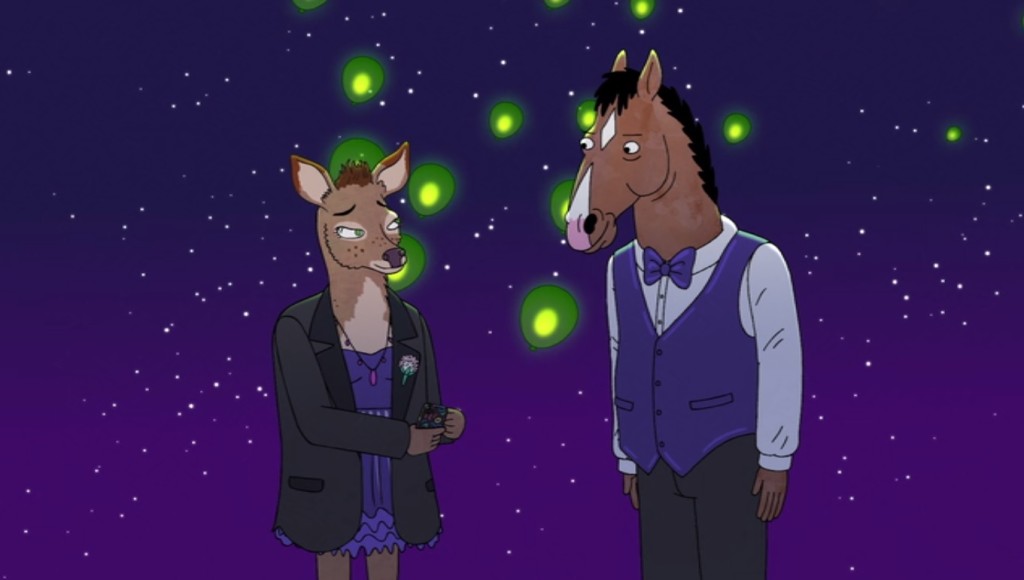
Look, I don’t mind people who say they love the show for the humor or drama. But telling me it’s the best example of depicting depression on TV? That’s where I draw the line. This show attempts to extract emotion in some of the most clunky, manipulative ways, by making characters inexplicably evil or moronic. Bojack’s childhood is ripped straight from a Tennessee Williams play where he was a sailor-clad, bright-eyed boy with hope but doomed from the start because his verbally abusive mother who immediately hates him and claims he’ll never be anything better than his drunken father.
Every attempt to have a real discussion is railroaded by absurdity, especially with Todd’s mind-numbing side plots of getting indoctrinated into an improv-centric cult and getting replaced by a Prince and the Pauper lookalike. But when the series wants to talk about mental issues, the writers unbearably hammer down the same points about narcissism and anxiety. Bojack never truly suffers from consequences while he simultaneously has all the resources available to cope/fix his flaws, which makes him very frustrating as a protagonist, but never in an enjoyable kind of way.
If you believe Bojack Horseman is a challenging depiction of depression, I implore you to check out shows like Louie or Wilfred that showcase very down-to-Earth people who struggle with day-to-day life. Both programs focus on people who want to be genuinely kind people, but they deal with the weight of the world on their shoulders in a very stressed, nuanced fashion without forcing you to feel sad about them. You could even go to shows like The Venture Brothers that uses “failure” as a constant reoccurring theme or even Morel Orel, which goes so incredibly grim dark in the final season, but makes you so emotional by the way everything ties together through religion.
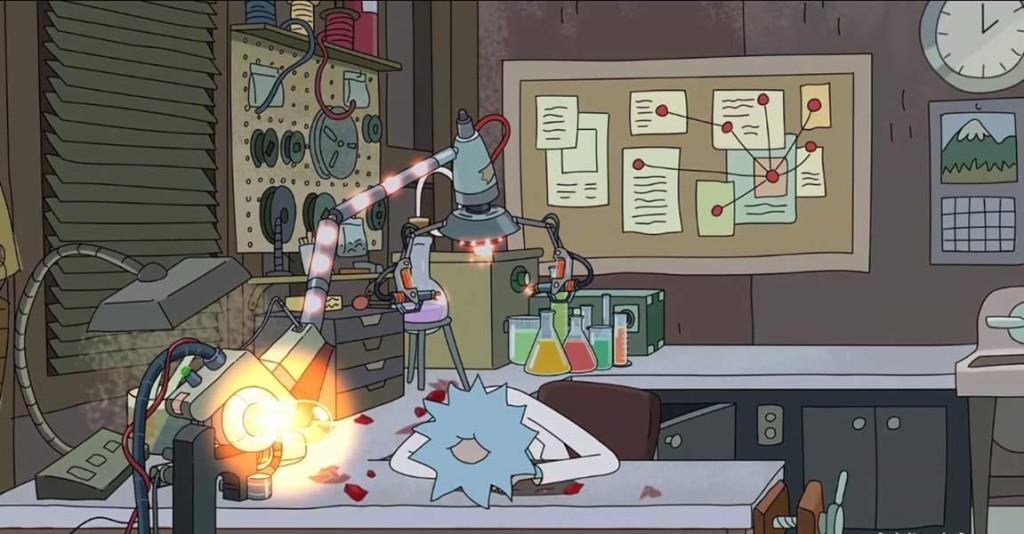
Bojack Horseman struggles making the same mistakes from Season 1 by focusing on badly told jokes and hamfisted commentary on fame, vulnerability and sadness. The moments it can be witty or imaginative are few and far between with most of the character buildup falling by the waste side. On Netflix where you have so much competition for laughs and tears, Bojack does not accomplish either very well from a poor sense of mismanagement, made abundantly clear in a recent interview with The Verge:
“If you watch season three, you’ll see that we go even further in the silly direction and even further in the serious direction,” Bob-Waksberg said. “And rather than it feeling schizophrenic, I think it actually feels like they complement each other.”
I have no shame in stopping at Season 2 if Season 3 continues to ignore subtlety and go flat out tone-deaf. If I regret anything about my previous article, I want to give credit to Lisa Hanawalt, whose obtuse designs and bizarre environments continues make the series stand out amongst the animation community. But if Bob-Waksberg didn’t have her style or Netflix’s broadcasting schedule, I don’t think his show would have stood at a chance at all. To quote another classic horse from the 90s:
My Arbitrary Rating for Bojack Horseman Season 2: 4 out of 10 Character Actors Who Deserve Better.
Now that I’ve taken the axe out of that dead horse, I can get back to the other big revelations that have happened in the Western Animation World. Can you say the return of full series retrospectives? I’ll see you soon with the next Animated Anarchy!

